M23
Secretary of State Marco Rubio on Friday oversaw the signing by Congo and Rwanda of a pledge to work toward a peace deal that would ease U.S. access to critical minerals in resource-rich eastern Congo, bringing U.S. influence to bear in a minerals trade that has helped fuel conflict that has killed millions for three decades.
Rubio's participation in the Washington ceremony with his Central African counterparts is an early step in what the Trump administration says is a rebuilding of U.S. foreign policy to focus on transactions of direct financial or strategic benefit to the United States.
Congo and Rwanda hope the involvement of the United States — and the incentive of major investment if there's enough security for U.S. companies to work safely in east Congo — will calm the fighting and militia violence that have defied peacekeeping and negotiation since the mid-1990s.
The risk is that the United States becomes involved in or worsens the militia violence, corruption, exploitation and rights abuses surrounding the mining and trade of east Congo's riches.
“A durable peace ... will open the door for greater U.S. and broader Western investment, which will bring about economic opportunities and prosperity," Rubio said, adding that it would “advance President Trump's prosperity agenda for the world.”
Congo is the world’s largest producer of cobalt, a mineral used to make lithium-ion batteries for electric vehicles and smartphones. It also has substantial gold, diamond and copper reserves.
Congolese President Felix Tshisekedi has sought out a deal with the Trump administration that could offer the U.S. better access to his country's resources in exchange for U.S. help calming hostilities.
Eastern Congo has been in and out of crisis for decades with more than 100 armed groups, most of which are vying for territory in the mining region near the border with Rwanda. The conflict has created one of the world’s largest humanitarian disasters with more than 7 million people displaced, including 100,000 who fled homes this year.
Conflict in eastern Congo is estimated to have killed 6 million people since the mid-1990s, in the wake of the Rwanda genocide. Some of the ethnic Hutu extremists responsible for the 1994 killing of an estimated 1 million of Rwanda's minority ethnic Tutsis and Hutu moderates later fled across the border into eastern Congo, fueling the proxy fighting between rival militias aligned to the two governments.
“Today marks not an end but a beginning,” Congolese Foreign Minister Therese Kayikwamba Wagner said Friday before signing the broad agreement, which commits Rwanda and Congo to draft a peace accord and work to instill security and a good business environment, allow the return of the millions of displaced and accomplish other goals.
“The good news is there is hope for peace," she said. "The real news is peace must be earned."
She directed part of her remarks to the civilians of east Congo, brutalized, isolated and displaced by the fighting: “We know you are watching this moment with concern, with hope and, yes, with doubt. You are entitled to actions that measure up to the suffering you have endured.”
Rwandan Foreign Minister Olivier Nduhungirehe said the two rival governments were now addressing the root causes of the hostility between them, the most important of which he said were security and the ability of refugees to return home.
“Very importantly, we are discussing how to build new regional economic value chains that link our countries, including with American private sector investment,” he said.
Trump’s senior adviser for Africa, Massad Boulos, the father-in-law of Trump's daughter Tiffany, helped broker the U.S. role in promoting security in east Congo, part of an opening that Boulos has said could involve multibillion-dollar investments.
The response from Congolese civil society Friday mixed hope with skepticism.
Rights advocate Christophe Muisa in Goma, a city in east Congo that the powerful, Rwandan-backed M23 armed group seized earlier this year, said the U.S. is the main beneficiary of the deal. He urged his government not to “subcontract its security.”
Georges Kapiamba, the president of the Congolese Association for the Access to Justice, a nongovernmental organization focusing on rights, justice and addressing corruption, said he supported a mineral-and-security deal with the U.S., but worried his own government could blow it by siphoning off the proceeds.
Three months into Trump's second term, his administration and Republican lawmakers have made good on pledges to pare U.S. diplomacy and foreign assistance down to agreements that most directly serve their perception of U.S. strategic and financial interests. The administration has terminated thousands of U.S. aid and development workers and programs that worked more broadly for global development.
In another such transactional deal, the Trump administration is negotiating with Ukraine over a minerals deal that the U.S. is demanding as repayment for past U.S. military support after Russia invaded in 2022.
Ukrainian President Volodymyr Zelenskyy initially proposed that deal last fall in hopes of strengthening his country’s hand in its conflict with Russia by tying U.S. interests to Ukraine’s future.
If the deal the U.S. is envisioning in east Congo goes well, it might end up stabilizing the region, said Gyude Moore, a former Cabinet minister in the West African nation of Liberia, now at the Center for Global Development, a think tank in Washington.
If not, “this deal, especially in a region crawling with conflict where there hasn't been a credible political solution, is fraught with risks for the United States as it pursues this extractive foreign policy in Africa,” Moore said.
Liam Karr, the Africa team lead at the Washington-based American Enterprise Institute's critical threats project, said the Trump administration and its advisers know enough to avoid the risks, including those of getting American security forces directly involved.
The larger risk is that American intervention meets the fate of U.N. and African peace efforts before it, Karr said. “And this just kind of falls flat on its face, and doesn't go anywhere."




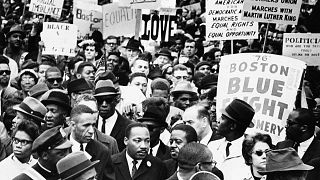
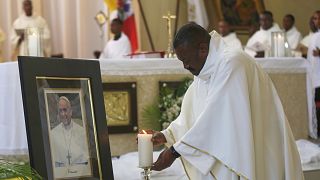
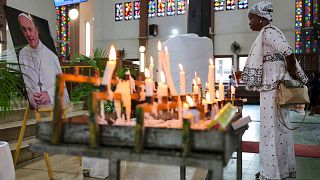



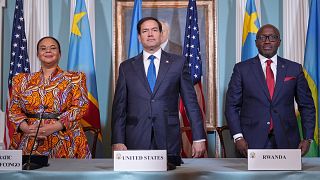
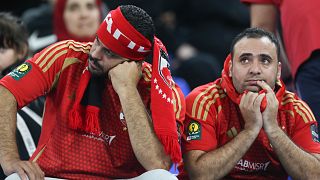
Go to video
Joseph Kabila’s return: Political comeback or threat to national unity?
Go to video
M23 and Congolese government agree to halt fighting, work towards peace
Go to video
Paris concert shines light on Congo's 'silent' war
Go to video
DRC: Goma Christians celebrate Easter under rebel rule
Go to video
Goma reacts to return of Kabila from exile
Go to video
DRC: Kabila arrives in rebel-held Goma after return from exile